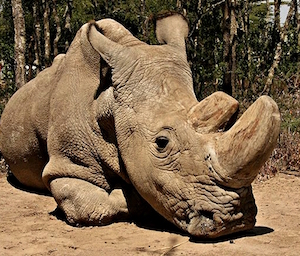| |
|
 |
Sudan the last white male rhino dies: it is a spiritual matter, Catholic eco leader says.
3 April, 2018:
 |
 |
 |
Sudan, the last white male rhino, died in Kenya last month. PHOTO: AP |
The last male rhino of its kind dies, African religious leaders call it a spiritual loss. Read the full story from Religion News Service.
Article by Fredrick Nzwili, Mar 24, 2018
NAIROBI, Kenya - Religious leaders who campaign for wildlife conservation are mourning the death of the world’s last male northern white rhino, calling the subspecies’ likely extinction a spiritual loss.
“We are staring at the extinction of the animal type, under our watch. I think it’s a spiritual matter,” said Father Charles Odira, a Roman Catholic conservationist priest from Kenya [and long-term partner of ARC].
“I feel as if we have neglected our duty as stewards of creation and should have done more for this species.”
The 45-year-old rhino - named Sudan - was euthanized Monday (March 19) after suffering an infection and serious complications due to his advanced age. He was kept under armed guard at the Ol Pejeta Conservancy, north of Nairobi, and left behind two female white rhinos - a daughter and granddaughter.
The two offspring have health problems that mean neither can likely carry a pregnancy to term, and that they will likely die as the last of their kind.
Father Charles Odira, a Roman Catholic priest, campaigns for wildlife conservation.
Sheikh Ole Naado, deputy general secretary of the Supreme Council of Kenya Muslims, urged wildlife conservationists to take the lessons from the death of Sudan.
“It is a kind of warning that others are taking a similar path. It could be telling us that something bigger is happening - like the possible extinction of a community,” said Ole Naado, referring to the Maasai tribe to which he belongs and whose lands bridge Kenya and Tanzania.
Many Maasai fear encroaching government and commercial interests and the effects of global warming will compromise or obliterate their traditional way of life. But they themselves understand that they must co-exist with wildlife, said Ole Naado.
As religious leaders preach protection of the natural world, some spiritual beliefs are also part of the problem.
Many people in Asia believe that various body parts of rhinos, elephants and other endangered animals possess healing powers or bring luck. Poachers - driven partly by this demand - continue to hunt these species relentlessly.
While a few northern white rhinos roamed Africa wild in the 1960s, by 2008, they lived only in zoos around the world.
Campaigns against the use of elephants’ ivory tusks for carving religious objects in Asia have met with some success, but the demand for rhino is still high. In countries such as Vietnam, a belief that rhino horn cures hangovers and cancer is widespread.
“Religious demand for wildlife products in parts of Asia has been a problem. We have talked to religious leaders in the region about how this is killing our wildlife,” said Odira.
“We believe God cannot commission the death of species that he had brought to life,” the priest added.
Read the full story from Religion News Service.
|
 |
 |
|
|
|
|
|
 |
Faiths for Green Africa
We are working with more than 25 Christian, Muslim and Hindu faith partners in Africa. |
 |
April 4, 2018:
Milestone in journey towards international faith-consistent investment
ARC has secured agreement to form an alliance for faith-consistent investment. The agreement was made by world faith representatives at a pivotal meeting at the UN HQ in New York last week. |
 |
September 30, 2017:
Why the global food industry is killing wild animals and why it matters
ARC's secretary-general Martin Palmer will be giving a talk at Compassion In World Farming's extraordinary and important conference in October on how over-farming is leading to extinction of species. Here he explains how a new narrative is needed, because the current system is about excess, greed and foolishness disguised as ‘market forces’. |
 |
 |
|
|

